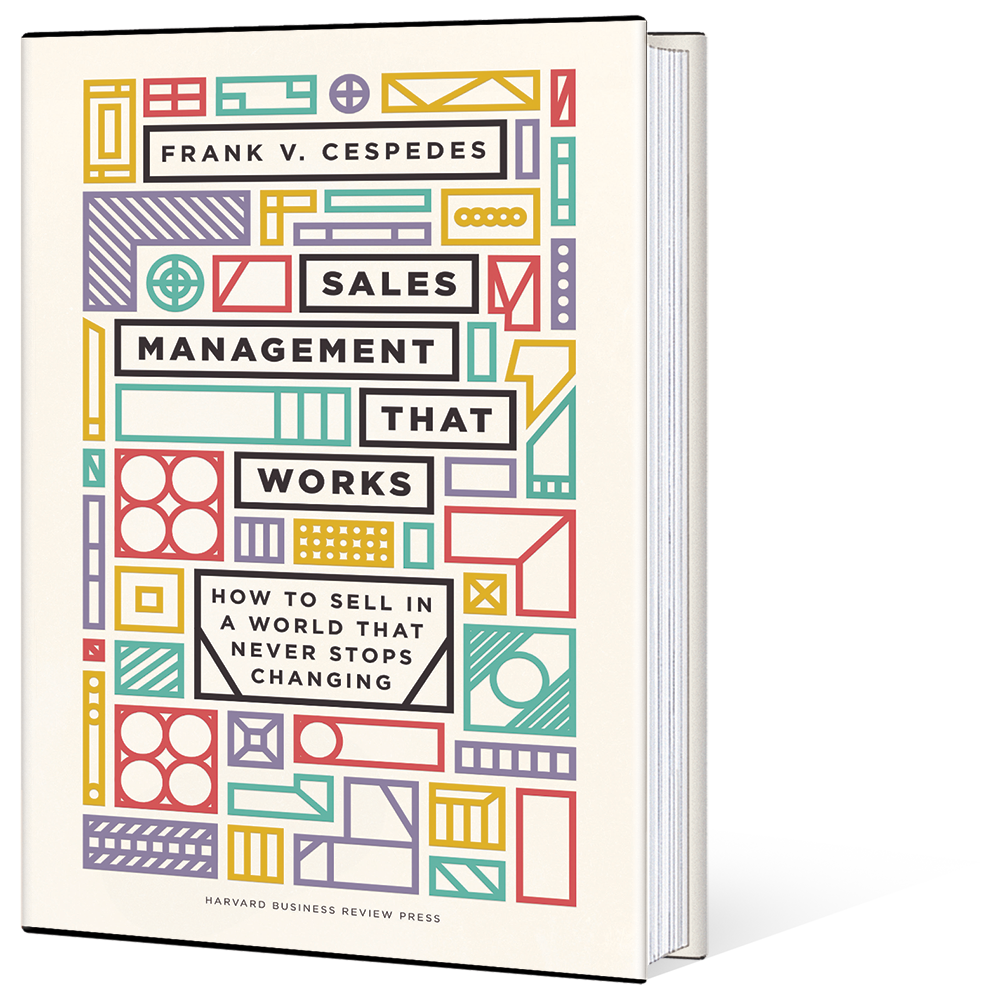By Frank V. Cespedes
Please note: This article recently appeared in the August 2021 edition of Top Sales Magazine.
In a previous article (“Sales Hiring Is Hard to Do,” January 2021), I discussed inherent challenges in sales hiring
and common practices that make a tough job needlessly harder. This article suggests practical ways to improve sales hiring.
Hire for the Task: Effective hiring starts with knowing what you need and, because sales tasks are determined by buying contexts,
what you need differs greatly by industry. In computers and electronics, channel management is a key capability, but not in metals and mining. In the former, the products are often part of a package that customers buy at one-stop-shop intermediaries; in the latter sectors, direct bulk buys are the norm. Account management skills are important in chemicals where managing a portfolio of specialty and commodity products is a key sales task, but not so much in electronics where channel partners often perform account management tasks.
Every sales job has implicit required behaviors. Take the time to clarify and make that explicit in your job postings. When companies focus on the tasks, not job titles, the relevant labor pool typically expands. Coding boot camps, for instance, are now an accepted source of software talent because after a few months of taskfocused work the participants have jobrelevant skills without (and often despite) previous formal degrees. The same is true in sales, where relevant talent comes in all shapes and sizes but is dependent upon the job to be done, not some abstract ideal of undifferentiated selling skills.
Avoid Behaviorally Useless Cliches: When you ask sales managers what they’re looking for in candidates and read about their practices, you typically get lists like the following: “Sense of Urgency, Passion, Keep it Simple, Show Me the Money. Proactive Work Ethic, Emotional Resilience, Communication Skill, Listening, Integrity, Humility and Gratitude, Ambition and Drive, Efficiency, Commitment to Succeed,” and so on.
These traits are behaviorally useless for doing what a hiring process must do: say yes or no to an individual applicant for a given job. When you’re speaking with someone at an interview, how do you unearth whether they have a “sense of urgency”? That author says, “Look for answers around impatience and 4thquarter comebacks.” Really? Confusing this stuff with job skills and evaluations is a waste of time and resources. In a job interview, who would not want to come across as hard working, resourceful, efficient, and so on? You’re hiring the person, not the interview version of the person, but only about a third of U.S. companies monitor whether their hiring practices lead to good employees or even track cost or time per hire.
Another problem with these lists is the assumption that a salesperson needs all of those qualities to be effective. However, it’s often advisable to shrink the span of sales activities. This requires understanding where the sales person (versus marketing or a customer success team) has the most influence. In many inside sales models, activities like lead generation and qualification are the jobs of SDRs, and renewals are given to service personnel. This allows the firm to focus more precisely on recruiting for Account Executive roles where product demonstrations, pricing, and closing the sale with a multifunctional buying unit are the key tasks.
Complement Interviews: Decades of research consistently show that managers overrate their ability to predict someone’s performance and fit for job tasks on the basis of interviews. Correlations between interview ratings and job success vary from about .1 to .4—less than the .5 rate of flipping a coin. Some studies show a negative correlation between interview assessments and subsequent job performance: the firm would have been better-off selecting at random!
Judging a person’s fit for a sales job is, in most circumstances, a complex task. It involves evaluating the relevance of past experience, personality, fit with the culture, and so on. But people are inconsistent in making summary judgments of complex information. Get multiple opinions and perspectives.
Doing multiple assessments also often motivates people in your firm to discuss and communicate the tasks you’re hiring for and the questions and activities likely to elicit relevant skills. Conversely, this approach provides the interviewee with a better basis to judge fit. Then, complement interviews with role plays, task assignments and, whenever possible, internshiptype hiring scenarios. Selling is about behavior. Job performance from one time period to the next correlates at a much higher rate than interviews. So probationary periods are better predictors of actual performance. Meanwhile, technology is increasing options for behavioral assessments via gamelike activities, video, and online media.
Assume Mistakes Will Happen: Sales hiring requires judging people’s future performance in a changing market environment. Mistakes are inevitable, but the sunk cost fallacy—continuing to throw good money after bad—is not.
Consider Amazon’s policy of offering a voluntary severance package called “The Offer.” Annually, each service and warehouse employee is offered up to $5,000 to quit. The policy helps to deal with inevitable mistakes—by the hirer or the person hired—and with the reality that people change and their relationship to their work can change with marriage, divorce, sickness, the need to take care of an aging parent, or any of the other natural shocks that flesh is heir to. Amazon believes “The Offer” helps it shed less committed employees while improving retention among others. Sales reps represent a company; a poor hire is not only costly but can also do collateral damage to your brand.
20 TOP SALES MAGAZINE AUGUST 2021

